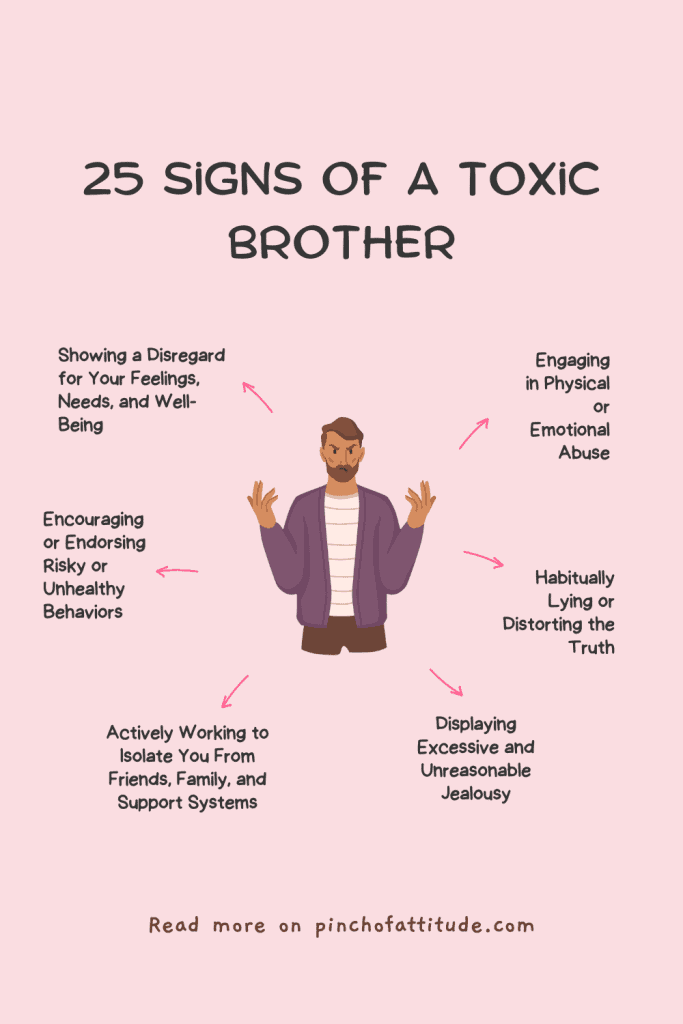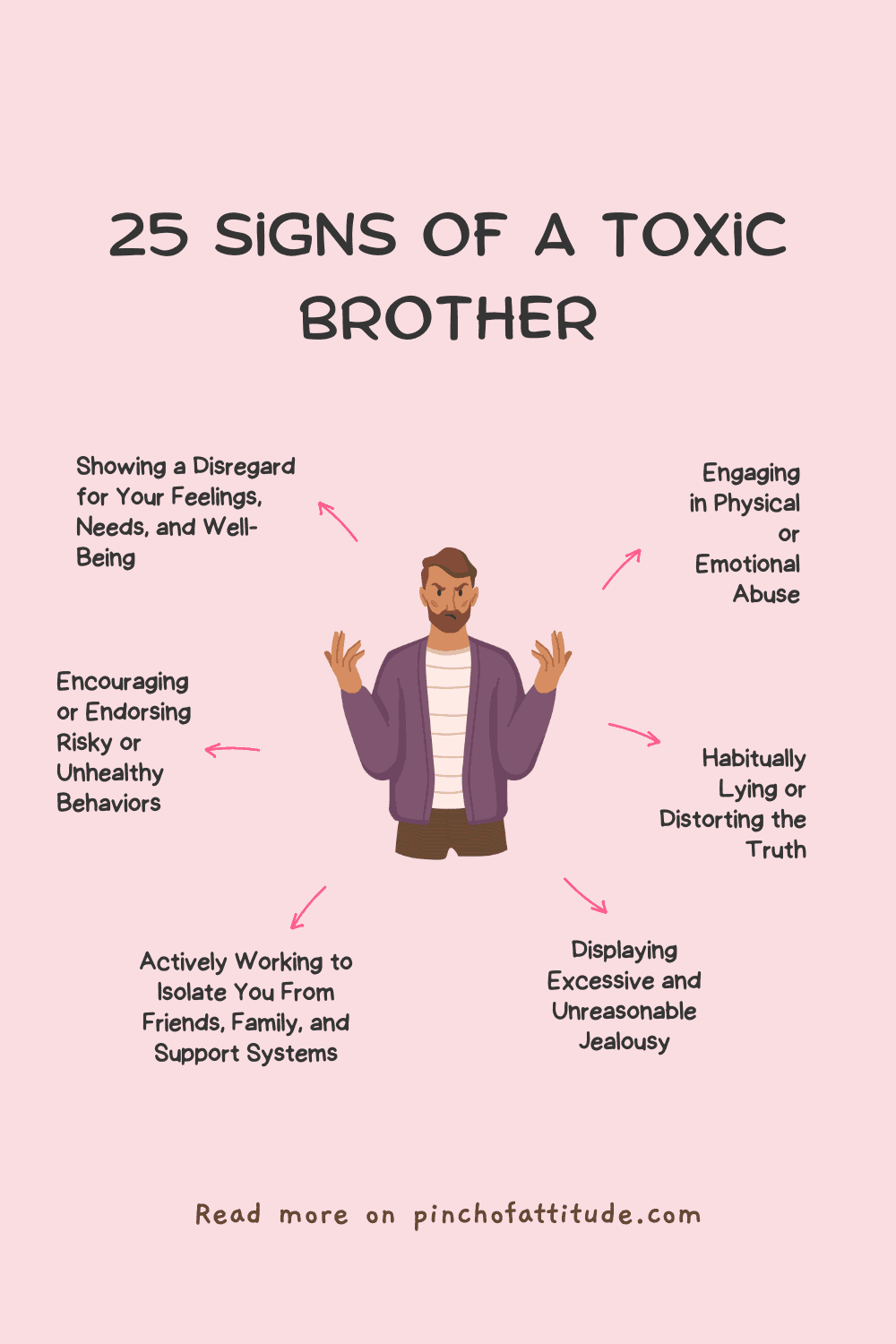As the middle child in a family with a golden boy brother, I know firsthand how it feels to have a younger brother who seems to have it all.
He’s our mom’s favorite, he has the good looks, the whole package.
Sadly, this special treatment came at a price, turning him into someone who prioritizes himself above everything and everyone else.
Sound familiar?
If you think your sibling might be crossing that line into “toxic” territory, let me share the signs of a toxic brother that I noticed in mine and the ways to deal with all that drama.
- A toxic brother might constantly belittle you, manipulate situations, or disregard your boundaries. Don’t ignore these red flags.
- Communicate your needs clearly and distance yourself if necessary. You deserve respect and shouldn’t tolerate negativity.
- You can’t force a healthy relationship if your brother isn’t willing to put in the effort. Seek support from friends, family, or professionals if needed.
25 Signs of a Toxic Brother

Some sibling squabbles are a normal part of life, but there are also some toxic patterns that can indicate a deeper issue.
The first step to address that issue is to recognize the red flags. Here are 25 signs you have a toxic sibling relationship with your brother:
1. Persistent Criticism Without Constructive Intent
Brothers and sisters can be brutally honest, sometimes to a fault. But there’s a difference between playful teasing and hurtful criticism.
For example, my brother consistently uses criticism as a weapon to tear me down without offering any constructive feedback or acknowledging my efforts.
Over time, this negativity became a pattern, poisoning our sibling dynamics and making it difficult for me to feel comfortable or supported around him.
2. Demonstrating a Consistent Lack of Empathy
While expecting unwavering support from an adult sibling might be unrealistic, a complete lack of emotional understanding can be a red flag.
I started questioning if our relationship could be toxic when my brother, someone I expected to offer support, didn’t show any empathy during a difficult time.
It’s not just about ignoring scraped knees or childhood arguments.
If you don’t feel his presence when facing personal struggles, there’s reason to believe you might not be as important to him as you think.
3. Exhibiting Manipulative Behaviors in Various Situations
One of the most draining aspects of dealing with a potentially toxic brother is their constant use of manipulation tactics to get their way.
They might make you feel guilty enough to do things you’re uncomfortable with, make empty promises, or play the victim to gain sympathy.
The goal? To control you and make you feel responsible for their happiness.
Tip
Don’t let your brother’s manipulative games control your choices. Find the courage to say “no” and prioritize yourself.
4. Displaying Excessive and Unreasonable Jealousy
While sibling rivalry can be common, it becomes concerning when it turns into excessive and unreasonable jealousy.
My brother, along with my equally toxic sister, will always try to one-up each other. This behavior stemmed from their low self-esteem and the toxic nature of their bond.
As you can imagine, this relentless comparison became a major source of stress and negativity in our family dynamic.
5. Habitually Lying or Distorting the Truth
Ask anyone and they’ll tell you that among the most stressful things to deal with is a toxic brother who constantly lies.
Imagine every time you talk, the conversation becomes riddled with lies and distortions. Naturally, after some time, you’ll feel confused, hurt, and unable to trust him.
In my case, my brother’s dishonesty has damaged the foundation of our relationship.
It created an environment of suspicion and anxiety, making it incredibly difficult for me to have any form of communication with him.
6. Engaging in Physical or Emotional Abuse
In his mind, he might look at it as him trying to tease you just a little. But if it leaves you feeling belittled or emotionally drained, that’s not okay.
While my experience with my brother didn’t involve physical abuse, his verbally abusive behavior took a significant toll on me.
That’s when I realized that emotional abuse doesn’t necessarily mean overt aggression. It can manifest through constant put-downs, insults, or even threats.
I refused to let that damage my self-esteem, so I cut ties with him before he could leave me any emotional scars.
Tip
If your brother’s behavior is causing you emotional distress, seek support and consider sibling estrangement to protect your well-being.
7. Showing a Repeated Disregard for Personal Boundaries
Of course, some disagreements are normal.
But toxic people, regardless of whether it’s a brother or sister, often have a problematic relationship with their sibling due to their blatant disregard for healthy boundaries.
You can try telling them they’re toxic and their behavior harms you, but they’d just brush it off or continue pushing the limits.
8. Constantly Blaming Others for His Failures
When one of the siblings always points the finger at others for his failures, it’s a concerning sign.
My brother, perhaps influenced by our family dynamics where I was often seen as the scapegoat, would frequently blame me for his shortcomings.
This behavior not only avoids personal responsibility but also creates emotional strain and a sense of injustice for the one being blamed.
9. Unwillingness to Compromise or Find Middle Ground
A healthy sibling relationship involves giving and taking, finding common ground, and compromising to reach mutually beneficial solutions.
However, a toxic sibling’s defining characteristic might be their unwillingness to compromise or even consider alternative perspectives.
They might prioritize getting what they want at all costs, regardless of the impact on others.
Like my brother, they think that their needs are the only things that matter, leaving everyone around them feeling unheard and undervalued.
10. Using Gaslighting Techniques to Distort Reality
Another one of the biggest signs that your sibling is toxic is if he uses gaslighting to distort your reality.
In fact, I noticed that many toxic siblings’ go-to is gaslighting, a technique used to manipulate others’ perceptions of reality.
How do I know this? My brother, of course!
He often denies ever saying something that hurt me, even when I have clear evidence. In turn, that makes me confused, disoriented, and feel like I overreacted.
11. Exercising Excessive Control and Dominance in Relationships
Growing up in a toxic family can sometimes make it difficult to recognize certain behaviors as unhealthy.
But if your brother demands control and dominance in all his relationships, that could be deemed toxic.
If his controlling behavior creates a harmful relationship within the family, you may have to set stricter boundaries just to maintain your individuality.
12. Refusing to Acknowledge or Take Responsibility for Wrongdoings
It’s frustrating when my brother consistently refuses to acknowledge or take responsibility for his wrongdoings.
My brother is known for shifting blame, playing the victim, or denying any responsibility for his actions.
The sad part is that one sibling often has to shoulder the emotional burden of trying to “fix” the situation, while the other shirks responsibility and avoids personal growth.
To help you deal with this dynamic, it’s important to seek support and prioritize your well-being.
13. Undermining and Dismissing Your Achievements and Efforts
A healthy relationship with your sibling should involve celebrating each other’s successes.
But if you have a toxic brother? He’ll most probably undermine and dismiss your achievements and efforts.
My brother used to make snide remarks about my accomplishments, downplay my hard work, or even take credit for my successes.
This behavior can be incredibly discouraging and make you feel like your achievements are insignificant.
14. Showing Inability or Unwillingness to Celebrate Your Successes
Unlike a supportive sister or brother who genuinely celebrates your wins and milestones, a toxic brother might struggle to acknowledge or even express happiness for your successes.
My brother always changes the subject whenever I share the good news, minimizes my accomplishments through backhanded compliments, and expresses envy disguised as “concern.”
This created a one-sided dynamic where, in his mind, my happiness diminished his.
15. Using Personal Information or Secrets to Betray You
One of the most hurtful signs of a toxic sibling I noticed in my brother was his willingness to use personal information or secrets I shared in confidence to betray me.
This disregard for my trust and privacy created a deep sense of betrayal and insecurity. It is also why I don’t even try to maintain a relationship going forward.
Trust is the foundation of any strong bond. A sibling who consistently breaks that trust is demonstrating a clear pattern of toxic behavior.
16. Displaying Excessive Anger or Hostility, Often Unprovoked

Going through life not knowing when a sibling could erupt into explosive anger is not a life anyone would wish for.
My brother, unfortunately, displayed this trait often.
He had a hair-trigger temper and would become angry because of seemingly trivial matters, often completely unprovoked.
Unsurprisingly, this unpredictable behavior created a constant sense of anxiety and fear in our interactions.
Sibling abuse can manifest in various ways. And this type of volatile behavior can be incredibly damaging to your emotional well-being.
17. Consistently Making Everything About Himself
Just like with my narcissistic mother, every interaction with my brother, from casual chats to major life events, seemed to somehow circle back to his experiences, needs, or desires.
Sure, younger siblings need more attention initially, but it shouldn’t extend into adulthood.
Whether it was your day at work, your latest achievement, or even a casual conversation, a toxic sibling may find a way to steer the focus towards himself.
18. Substance Abuse That Negatively Impacts Relationships and Family Dynamics
Not every sibling who struggles with substance abuse is inherently toxic.
However, a toxic element can arise when their behavior affects your relationship and the overall family dynamic negatively.
How so? You see, their addiction might lead them to prioritize getting a fix over their basic needs.
They might even borrow money for food or rent, only for you to find out they spent their money on something else.
Tip
Stop doing things for your sibling if they aren’t willing to change. Otherwise, you’re just setting yourself up for more pain and betrayal.
19. Demonstrating a Reluctance to Apologize or Admit Fault
My brother rarely, if ever, apologizes or admits fault, even when faced with clear evidence of his wrongdoing.
This constant deflection of responsibility took a toll on our relationship.
In a healthy family, you can let your sibling know when they’ve caused hurt and they’ll genuinely apologize.
This unwillingness to take accountability is a significant sign of a toxic relationship.
20. Being Unreliable and Irresponsible in Important Matters
Anyone would expect two siblings to help each other out. But in my case, relying on my brother for anything important came with a heavy dose of anxiety.
Whether it was showing up late for events, neglecting shared responsibilities, or failing to fulfill commitments, an unreliable toxic brother can leave you feeling stressed, disappointed, and ultimately, unable to depend on him.
This constant unreliability not only affects specific situations but also damages trust and creates a sense of insecurity in the relationship.
21. Creating and Escalating Unnecessary Drama
My brother thrived on creating and escalating unnecessary drama, seemingly out of thin air.
From picking fights over trivial matters to gossiping and stirring negativity within the family, he’d done it all.
This constant drama creation not only made simple interactions stressful but also impacted other areas of our lives.
Family gatherings became tense, social events felt awkward, and even casual conversations held the potential to erupt into conflict.
Tip
If your sibling is causing unnecessary stress in your life, limit contact or cut ties completely. If you don’t, you may become toxic yourself.
22. Showing a Disregard for Your Feelings, Needs, and Well-Being
I could understand my brother prioritizing his wants and needs.
What raises a red flag for me is when he disregards my needs and easily brushes aside my feelings just so he can get what he wants.
I can remember many times he showed a clear lack of care for my emotional well-being, from making insensitive jokes to overstepping my boundaries.
But that’s in the past. I now know that I deserve to be treated with kindness and respect.
Remember, your sibling’s toxic behavior isn’t your fault. You should not feel obligated to sacrifice your well-being to maintain peace.
23. Encouraging or Endorsing Risky or Unhealthy Behaviors
Siblings go and push you to do things outside of your comfort zone.
It’s a different story when your sibling puts you in a situation where you feel like you have no choice but to follow along to maintain their approval or avoid conflict.
This is especially true if they’re pushing you to do things that are risky or unhealthy. They might downplay the potential consequences or make light of your concerns.
If you feel unsafe around your sibling because of such behaviors, remember that you have the power to make your own choices.
24. Maintaining an Overly Competitive Attitude Toward You
Growing up with a brother can naturally involve some friendly competition.
But what I learned over time is that there’s a clear distinction between healthy sibling rivalry and a toxic brother who constantly tries to turn everything into a competition.
My brother, unfortunately, fell into the latter category.
This relentless competition created a stressful and hostile environment, making it difficult to celebrate individual victories or simply enjoy shared experiences.
25. Actively Working to Isolate You From Friends, Family, and Support Systems
A toxic brother might make up lies about you, spread rumors, or create conflict to drive a wedge between you and the people who care about you most.
This behavior is a clear attempt to try to control your life and manipulate your environment.
My brother used to criticize my close circle, make negative comments about other members of the family, or even actively try to sabotage my relationships.
If you’re facing the same dilemma, tell your sibling that his behavior is unacceptable. You deserve to have a healthy and supportive circle.
Related Posts:
- How Do You Emotionally Detach From a Toxic Brother?
- How Do You Deal With a Jealous Brother? Here’s What I Personally Did
- How Do You Deal With a Toxic Brother? My Simple but Effective Strategies
- When Should You Let Go of a Toxic Brother? My Answer From Personal Experience
- How to Cut Ties With Your Toxic Brother? It Was Worth It for Me
Frequently Asked Questions
How do you differentiate normal sibling conflicts from toxic behavior?
Normal sibling conflicts involve disagreements that are resolved without lasting harm. Toxic behavior includes criticism, manipulation, and lack of respect that cause emotional or physical harm.
Can a toxic brother change his behavior, or is it a permanent trait?
Yes, a toxic brother can change his behavior with self-awareness, effort, and possibly therapy. Change is possible but requires commitment and willingness to address underlying issues.
How can setting boundaries with your toxic brother contribute to a healthier relationship?
Setting boundaries with your toxic brother establishes limits on harmful behavior. It helps you deal with a toxic sibling by protecting your well-being and promoting more positive communication.
Can seeking therapy or counseling help in improving the relationship with your toxic brother?
Seeking therapy or counseling is an effective way to deal with toxic siblings. It offers support and strategies for setting boundaries and promoting healthier dynamics.
What impact can a toxic brother-sister relationship have on other family dynamics?
Toxicity in sibling relationships can create tension and divisions within the family. It may lead to strained interactions and emotional distress for other family members.





Kolyanne – I found this article to be so helpful for me and my family dynamic! I appreciate your sharing examples that are difficult for you and I so appreciated that. I do have a toxic mother and twin brothers that I have really tried over the years to help and build a relationship with but it always came back somehow so twisted that I am a horrible person for my family’s behavior. It’s embarrassing to explain ya – I can’t speak to anyone from my family because they are all toxic towards me now but it’s good to know I am not the only one that struggles and so jealous of others that can have outings and have fun family gatherings just not in the cards for me! This article helped me a lot. Thank you!